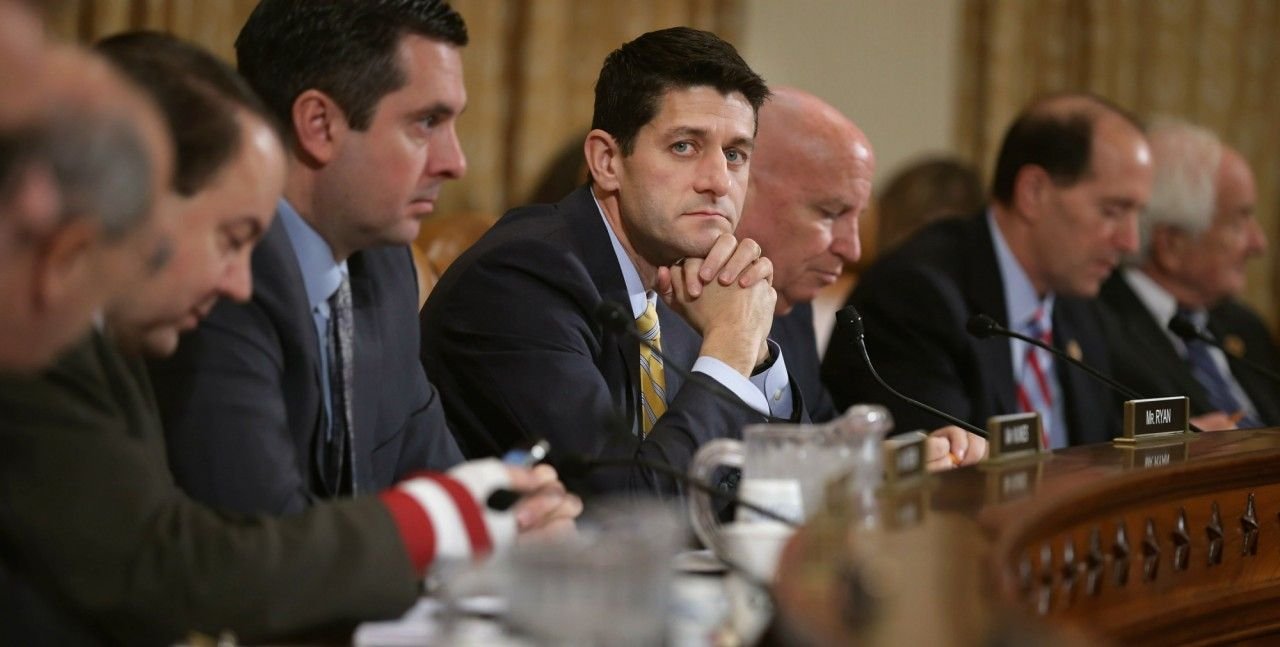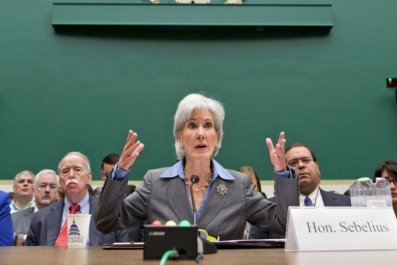On Sunday May 15, 2011, Newt Gingrich made a big mistake. The former House speaker and then-Republican presidential contender went on NBC's Meet the Press and attacked the new budget from Representative Paul Ryan, R-Wisconsin, as "right-wing social engineering" for replacing traditional Medicare with premium support. Or, as Democrats liked to call it, vouchers.
Two days later, under siege from Republicans for failing to toe the party line, Gingrich apologized to Ryan. But the damage was done. In the Republican presidential primaries, Gingrich was attacked for not supporting Ryan, the coming conservative star. Eventually, of course, Mitt Romney won the GOP nomination and, as a mark of his conservative bona fides, selected Ryan as his running mate, calling the Ryan budget "marvelous."
But a lot has changed in the Republican Party since the 2012 election. Once the darling of conservatives, Ryan's budget-cutting, entitlements-reforming crusade has been overshadowed by Tea Partiers equally if not more committed to cutting public spending. As Adam Brandon, executive vice president at the Tea Party group FreedomWorks, put it, "I'm a fan of Paul Ryan, but Mike Lee is my hero," referring to the conservative Utah senator and a driving force behind the government shutdown.
It is in this new Republican universe that Ryan is leading the House of Representatives' coalition to hammer out a compromise in a budget conference with the Senate. As talks play out over the next six weeks, Ryan will be forced to decide whether to cut a deal with Democrats, potentially alienating the ultra-conservatives and libertarians, or sabotage the talks to stay in the Tea Party's good graces. For a man who has his eyes set on the speakership or even the White House one day, it's a big decision to make.
"It's tricky in every respect with a capital T," said conservative commentator Norm Ornstein. "There's no question the center of gravity in the party is not just off on the right, it's off on the radical fringe. So how much are you going to buck that? How much can you change that center of gravity?"
What we know in the lead-up to the budget talks, which began on Wednesday and must end by December 13, is that Ryan is lowering expectations. Rather than the elusive "grand bargain" Washington has sought in vain for years, Ryan's public statements indicate he wants a small bargain that focuses on the painful sequester spending cuts that Democrats and many Republicans want to undo. "I think we all agree that there's a smarter way to cut spending" than sequestration, Ryan said earlier this month.
But even a small bargain could put him at odds with his base. The key disagreement is how exactly to replace the sequester cuts. Democrats going into the budget conference want to use a combination of cuts and revenue-raising, with the new money coming from closing tax loopholes, raising fees, or finding some other avenue to bring in extra money rather than raising tax rates. Conservative Republicans want to see the cuts shifted away from military spending, either toward other discretionary spending or entitlements, but they insist there should be no new revenue-raising.
Democrats want to see spending levels increase from the current $986 billion per year, or worse for them, $967 billion, which is where annual spending will stand once the second round of sequester cuts take effect in 2014. As recently as this month, Ryan expressed a desire to shift the cuts over to modest entitlement reforms, but Democrats have said that's a nonstarter outside the context of a grand bargain.
Even a small deal will force Ryan to choose sides, either compromising with Democrats or backing the GOP's absolutist "no new taxes" conservative base.
There are signs Ryan is anxious about his standing with the Tea Party. The most glaring example of how he has pandered to them is his October 16 vote against the deal to reopen the government and raise the debt limit, a move that has political observers scratching their heads. One explanation, said Ornstein, is that it was "a very clever if Machiavellian move to gain some street cred with the radical forces in his own party so that if and when he struck a deal he'd have an easier time selling it."
Rich conservative groups like Americans for Prosperity (AFP) and FreedomWorks are ready to lobby against a deal that does not strictly hold the budget at sequester levels. "The most important thing for us is locking in sequester-level spending," said AFP President Tim Phillips. On his feelings toward Ryan heading into negotiations, Phillips went with a phrase President Ronald Reagan used when dealing with the Soviet Union over nuclear disarmament: "Trust but verify."
At a minimum, Phillips said he would be urging his group's 2.3 million members to petition lawmakers not to break the sequester caps. If it looks like conferees are getting close to a deal that would raise spending, the group would ramp up its campaigning. But that's nothing compared to what AFP would do if Republicans, led by Ryan, backed a deal that raised spending.
"Right now we're spending over $2 million to hold accountable two [Democratic] United States senators, Senator [Kay] Hagan and Senator [Mary] Landrieu," he said, referring to attack ads over the Affordable Care Act. "On the House side we're holding accountable five. And I tell you, we'll do the same thing on the spending side. If that means some Republicans, so be it."
We know how easy it is for the ultra-conservatives to cast aside tried-and-true moderates if they misstep. Just ask Senator Marco Rubio, once a conservative favorite, who is struggling to maintain his credibility among conservatives in the GOP base since he pushed for comprehensive immigration reform earlier this year, an effort Ryan backed. Rubio's moderation counted against him when freshman Senator Ted Cruz, R-Texas, swooped in, precipitated a government shutdown, and replaced Rubio in the hearts of Tea Party activists.
But is Ryan in danger of losing his conservative following? No, says Rick Wilson, a conservative Republican strategist in Florida. "No rational person is going to confuse Paul Ryan with a squish," he said, a term used to deride moderate conservatives who compromise their principles. "He's got impeccable conservative credentials across the board."
If Wilson is right that Ryan's brand is safe, that might give the Budget Committee chairman some breathing room to bring together both flanks of the Republican party in a deal. Even better for Ryan, if Republicans can impose some unity on the party over the next few weeks and repair the fractures caused by the shutdown fiasco, Ryan could use this temporary unity to strike a deal. Given his conservative record, "there may be an opportunity for him to become a conduit between the more established Washington crowd and this growing insurgent movement," Wilson said.
"I think his standing in the House matters to him, and his ability to do something that's going to keep at least a sizable portion of his party together matters," Ornstein said. "He doesn't want to do something that ends up passing with 180 Democrats and 40 Republicans."
As the budget talks get under way, no one knows what path Ryan will follow. "What's Paul Ryan's bottom-line motive here?" Ornstein said. "Are you looking to your own political future? Are you so driven by your deep-seated ideology that you just can't compromise a significant part of this away? Are you seeing this as getting away from what can be a potential disaster from your own party? How pragmatic are you?"
So the budget negotiations could define Paul Ryan's future in the GOP. But they will also help define for everyone else exactly who Paul Ryan is.

























